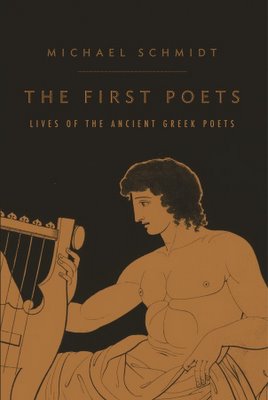
"There will be some who remember us when we are gone." - Sappho
I started reading The First Poets by Michael Schmidt to distract myself from a disheartening loss by Patriots. (By the way, a belated Happy Birthday to K.) The first chapter on Orpheus is prefaced with a poem by Wallace Stevens and an opening paragraph that wakes Greek poetic history up and make it more inviting to me than it was in high school. This may be a bit too much to chew on as a library book for a short check out period but it is a volume that of course I want to own eventually. At long last I can learn more about Semonides of Amorgos (who is naturally not to be confused with Simonides of Cos). That would be a rookie mistake. The following is from intro to Orpheus chapter.
He left half a shoulder and half a head
To recognise him in after time.
These marbles lay weathering in the grass
When the summer was over, when the change
Of summer and of the sun, the life
Of summer and of the sun, were gone.
He said that everything possessed
The power to transform itself, or else,
And what meant more, to be transformed.
WALLACE STEVENS,
"Two Illustrations That The World Is What You Make of It,"
"What would a man not give," declares Plato in the Apology, "to engage in conversation with Orpheus and Musaeus and Hesiod and Homer?" Can we do something of the sort? If not to engage in conversation, then at least to glimpse them as they go about their holy and unholy business?
If I start with Orpheus, father of poetry, of music and, some say, of the art of writing itself; tamer of wilderness and wild hearts, servant of Apollo and, paradoxically, servant also of a new Dionysus; torn limb from limb as Dionysus was himself; dissuader of cannibals, maker of the ordered liturgies that displaced the abandoned frenzy of the orgies . . . If I start with Orpheus, it is to make it clear from the outset that this is a history in something other than the modern sense of the word. My Muse is Clio, as she was Plutarch's and Pausanias'. My Muse is Calliope, as she was Homer's and Apollonius of Rhodes'. And Erato of the lyric, tragic Melpomene, spirited Thalia shaking with laughter at solemn, spiritual Polyhymnia, who mutters prayer and praise. Orpheus is a hero, not a god, and a hero more valuable than most of the gods, just as Prometheus was.
2 comments:
I used to read a lot of the Classic, classic Greek poets when I was younger and haven't even thought about them in a while. Thanks for reminding me. Maybe I'll drag out some of my poetry and mythology books too.
I just picked up a copy of Edith Hamilton's mythology so I was more ready to dive into it then i might have been going in cold.
Post a Comment